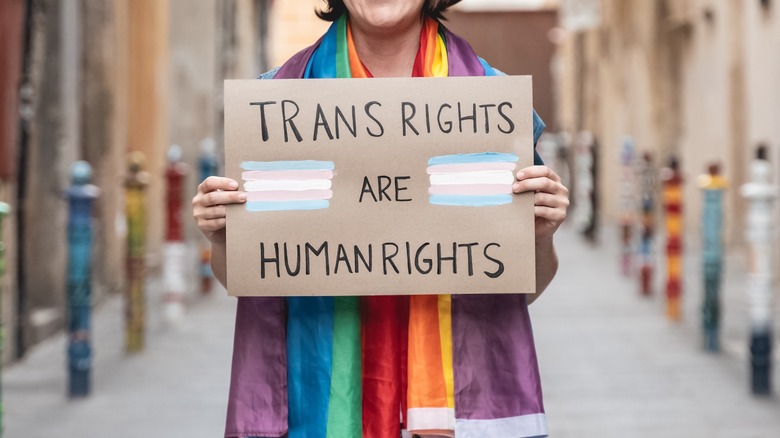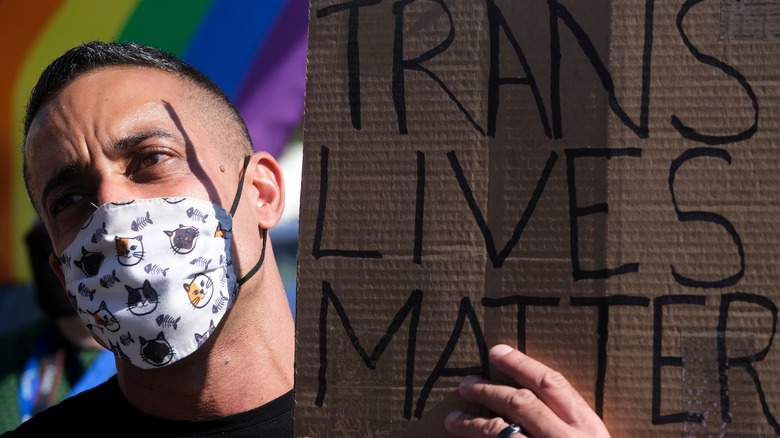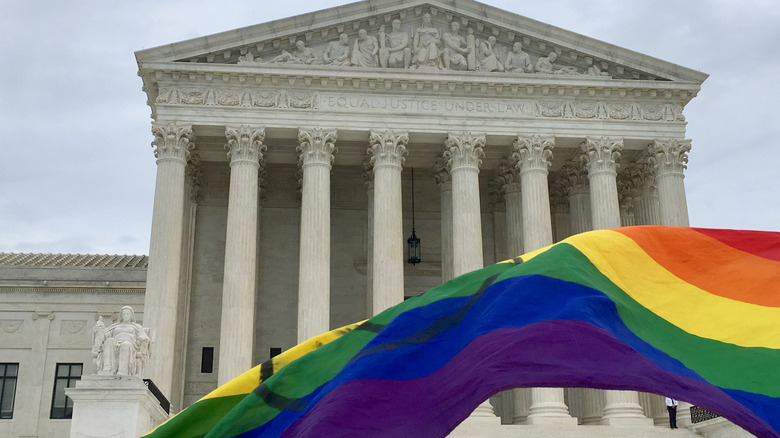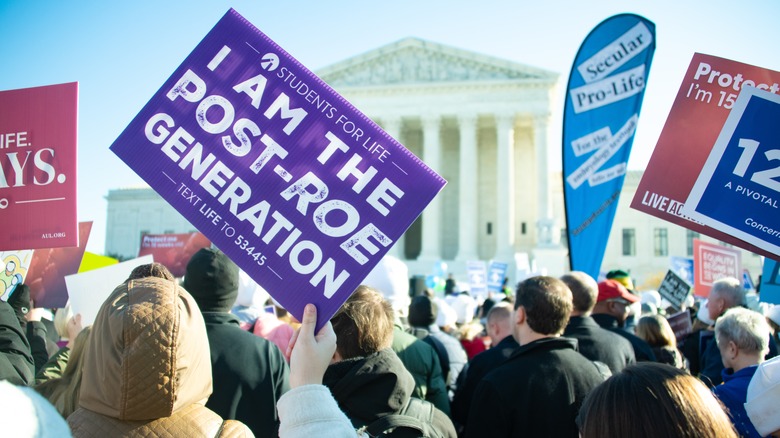What You Need To Know About The Latest Anti-Trans Laws Sweeping The Nation
Despite being the party of "personal freedom," many Republicans have been fighting to limit the rights of trans people. Since North Carolina passed their "bathroom bill" in 2016, the wave of anti-trans laws being introduced in state legislatures has only grown, their reach expanding into restricting who has access to gender-affirming healthcare, per USA Today. Legislatures have since been emboldened by the Supreme Court's 2020 Bostock v. Clayton County decision, which ruled that companies with 15 employees or more could not discriminate on the basis of sexuality or gender identity, per The Washington Post.
As the ACLU explains, the Bostock decision makes it possible for an employee in any state — regardless of the state's political leaning — to file a complaint with the Equal Employment Opportunities Commission if they believe they've been fired for discriminatory purposes. The ACLU added that sexual and gender orientation cases that had previously been dismissed were now able to be revisited because of the Supreme Court's decision, with many using the Supreme Court's own compelling reasoning, rather than any anti-discrimination laws, to win their cases.
Despite Republican Senator Josh Haley of Montana saying the Supreme Court's decision "represents the end of the conversation legal movement," The Washington Post reports that the introduction of anti-trans laws in the United States has only increased. In an investigation back in January 2022, USA Today found that ahead of the 2022 legislative sessions, there were already 280 bills that either had been filed or were being filed.
The number of anti-trans laws has been growing since 2016
LBGTQA+ rights advocates have found that in 2022, there has been more legislation proposed to limit the rights of trans people than at any other time in history. While North Carolina's bathroom bill was arguably the beginning of discriminatory legislation, states like Texas, Virginia, and Alabama have gone even further than North Carolina in limiting trans peoples' rights.
In Texas, Governor Greg Abbot signed a directive that categorizes parents who seek gender-affirming care for their trans children as abusive, The Washington Post reports. Alabama Governor Kay Ivey banned gender-affirming healthcare completely, stating, "We're going to go by how God made us: if the Good Lord made you a boy, you're a boy, and if he made you a girl, you're a girl. It's simple." For Virginians wanting to change their names or pronouns at school, Governor Glenn Youngkin announced in September 2022 that there would be new, more-difficult guidelines, per The Washington Post.
But the rise of restrictions and new legislation saw more fervor, in 2018 The Washington Post reports, amid Donald Trump's presidency. In 2020, the Trump administration clarified that "sex discrimination" protections did not apply to gender identity, despite the ruling in Bostock v. Clayton County. Trump, whose own wife did not agree with the decision, later rolled back the decision, but states continued — and continue to — move forward with trying to repeal trans rights (via The New York Times).
These are the trans rights Bostock v. Clayton County is supposed to protect
The Supreme Court's decision in Bostock v. Clayton County was seen as a major step forward for equal rights and protections for LGBTQA+ people, per the ACLU. Many cases — like Grimm v. Gloucester County School Board – have been able to be re-litigated through appeals courts. The ACLU explains that a federal U.S. Court of Appeals for the Fourth Circuit Court found that "bathroom bills" aren't just a violation of Title IX, but a decision that was in direct opposition of Bostock.
Ballard Spahr points out that the Bostock decision made by the Supreme Court did not specifically "address bathrooms, locker rooms, or anything else of the kind." But they explain that in declining to hear arguments in Grimm v. Gloucester — combined with an executive order from President Joe Biden and a memorandum from the Department of Justice — legal protections have extended to schools.
Lawmakers have not slowed down on creating new laws and restrictions, however, leaving many — trans youth especially — worried about having legal protections to be who they are one day and losing them the next. "I don't know how to describe to somebody that isn't going through it how it feels to have the anxiety of waking up every morning, not knowing whether your state is going to attack your right to exist," Orlando-based trans advocate Alyssa MacKenzie told The Washington Post.
Anti-abortion groups are backing anti-trans laws
What's important to remember about the 2022 political climate in America is that the same Supreme Court that ruled in favor of federal protections against sexual orientation and gender identity discrimination also overturned Roe v. Wade. This is the Supreme Court of Justice Clarence Thomas, who wants topics like gay marriage revisited.
It's no surprise that abortion rights have the spotlight this election season, with surveys showing the topic being one of the top issues driving people to the polls in the 2022 midterms. But according to Dave Carney, a senior advisor for Texas Governor Greg Abbott's reelection campaign, introducing laws and restrictions against trans youth specifically is a major crowd pleaser for conservatives (via The Washington Post). Reporting by The 19th shows that the GOP is hoping the onslaught of anti-trans laws and restrictions will get Evangelical voters to the polls.
In the Venn diagram of people who are anti-abortion and pro-trans restrictions, the overlap is large. According to The Washington Post, a conservative Christian legal advocacy group called Alliance Defending Freedom isn't just at the forefront of the fight against abortion, but they're also responsible for drafting the Fairness in Women's Sports Act, which banned trans girls from playing on girls' sports teams.
NPR adds other states including Arkansas, Mississippi, Tennessee, West Virginia, South Dakota, Florida, Montana, and others have either proposed similar legislation or have already signed the bans into law.



